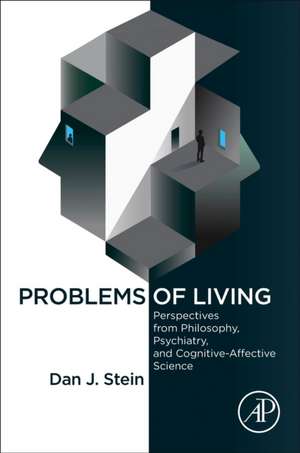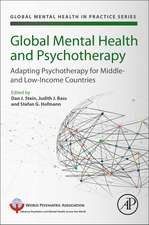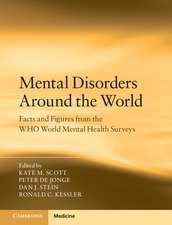Problems of Living: Perspectives from Philosophy, Psychiatry, and Cognitive-Affective Science
Autor Dan J. Steinen Limba Engleză Paperback – 14 mai 2021
- Draws on the strongest aspects of polar positions in philosophy and psychiatry to help resolve important perennial debates in these fields
- Explores continuities between early philosophical work and current cognitive-affective sciences, including neuroscience and psychology
- Employs findings from modern cognitive-affective science to rethink key long-standing debates in philosophy and psychiatry
- Builds on work showing how mind is embodied in the brain, and embedded in society, to provide an integrated conceptual framework
- Assesses both the insights and the limitations of cognitive-affective science for addressing the big questions and hard problems of living
Preț: 686.87 lei
Preț vechi: 877.21 lei
-22% Nou
Puncte Express: 1030
Preț estimativ în valută:
131.43€ • 137.59$ • 108.75£
131.43€ • 137.59$ • 108.75£
Carte tipărită la comandă
Livrare economică 29 martie-12 aprilie
Preluare comenzi: 021 569.72.76
Specificații
ISBN-13: 9780323902397
ISBN-10: 0323902391
Pagini: 326
Dimensiuni: 152 x 229 x 20 mm
Greutate: 0.44 kg
Editura: ELSEVIER SCIENCE
ISBN-10: 0323902391
Pagini: 326
Dimensiuni: 152 x 229 x 20 mm
Greutate: 0.44 kg
Editura: ELSEVIER SCIENCE
Cuprins
1. Introduction
2. Brain–minds: What’s the best metaphor?
3. Reason and passion
4. The pleasures of life
5. Pain and suffering
6. The good and the bad
7. How can we know what is true, then?
8. The meaning of life
9. Conclusion: Metaphors of life
2. Brain–minds: What’s the best metaphor?
3. Reason and passion
4. The pleasures of life
5. Pain and suffering
6. The good and the bad
7. How can we know what is true, then?
8. The meaning of life
9. Conclusion: Metaphors of life
Recenzii
"Problems of Living must be acknowledged as one of the most remarkable achievements to which his (Stein's) already acclaimed accolades attest. It is an excellent example of what can be achieved in terms of interdisciplinary work, when this work is the outcome, not of a dilettante, but of a true specialist in different fields – in this case psychiatry, philosophy and neuroscience… What this reviewer appreciated more than everything else, is Stein's conviction that the traditional 'big' questions of philosophy – What is the relation between reason and passion? Is there any sense in pain and suffering? How can we distinguish between good and bad? When are we dealing with truth? What is the meaning of life? – are not only still valid, but can be approached from a variety of the interdisciplinary perspectives, and that significant (or at least notable) progress can be made with such an enterprise, without any claim that all questions have been definitively or adequately answered… Whether the journey metaphor is the most appropriate for our understanding of life, remains to be seen. There can, however, be no doubt that reading Stein's book is a journey through a masterpiece. It is one of the most enriching experiences that this reviewer has had in a long time." --South African Journal of Science
"Dan Stein's new books is an engaging and courageous piece of writing that raises fundamental questions about the nature of mind and brain. It examines how to live a fulfilling life and be contented, despite the paradox of, on the one hand feeling our lives are central to the world, and on the other, that we are just one of many species… Stein investigates the mechanisms that underlie reason and passion, from a philosophical and psychiatric perspective. There are key implications for psychiatric and psychological practice, public mental health and societal flourishing. His primary source material is rich, and he communicates a sense of awe and of wonder about our precious and transient lives, as well as a synopsis of a more authentic and progressive scientific account of the mind and brain wetware. All trainees and students of subjects related to the mind and brain should read this book, as should those specialists working daily in health and social systems and public mental health. The book busts many myths simply by sharing what we know about the brain and mind, which is a great deal, but it also is clear on the limitations of our thinking." --British Journal on Psychiatry
"The book is interesting in its approach to answering traditional philosophical questions through an integrated manner, utilizing perspectives from philosophy, psychiatry, and cognitive-affective science. The author is uniquely qualified to discuss these questions from all of these perspectives given his credentials. While the author has answered the objectives, the book was difficult to read and comprehend at many points, despite my background as a physician in psychiatry, as it requires a significant amount of background knowledge in philosophical theories. The author tries to mitigate this by providing extensive references throughout, but this does little to help the readers if they have not performed a significant amount of outside research." --© Doody’s Review Service, 2021,Chad R Percifield, DO(Michigan State University College of Medicine) reviewer, expert opinion
"Dan Stein's new books is an engaging and courageous piece of writing that raises fundamental questions about the nature of mind and brain. It examines how to live a fulfilling life and be contented, despite the paradox of, on the one hand feeling our lives are central to the world, and on the other, that we are just one of many species… Stein investigates the mechanisms that underlie reason and passion, from a philosophical and psychiatric perspective. There are key implications for psychiatric and psychological practice, public mental health and societal flourishing. His primary source material is rich, and he communicates a sense of awe and of wonder about our precious and transient lives, as well as a synopsis of a more authentic and progressive scientific account of the mind and brain wetware. All trainees and students of subjects related to the mind and brain should read this book, as should those specialists working daily in health and social systems and public mental health. The book busts many myths simply by sharing what we know about the brain and mind, which is a great deal, but it also is clear on the limitations of our thinking." --British Journal on Psychiatry
"The book is interesting in its approach to answering traditional philosophical questions through an integrated manner, utilizing perspectives from philosophy, psychiatry, and cognitive-affective science. The author is uniquely qualified to discuss these questions from all of these perspectives given his credentials. While the author has answered the objectives, the book was difficult to read and comprehend at many points, despite my background as a physician in psychiatry, as it requires a significant amount of background knowledge in philosophical theories. The author tries to mitigate this by providing extensive references throughout, but this does little to help the readers if they have not performed a significant amount of outside research." --© Doody’s Review Service, 2021,Chad R Percifield, DO(Michigan State University College of Medicine) reviewer, expert opinion
















